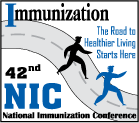
|
|
CDC NIP/NIC Home Page
|
Tuesday, March 18, 2008
239
Developing a strategic plan for improving and sustaining high childhood immunization rates - Experience of a statewide coalition in Kansas
Gianfranco Pezzino, Kansas Health Institute, 212 SW Eighth Av, Suite 300, Topeka, KS, USA
Learning Objectives for this Presentation:
By the end of the presentation participants will be able to describe the goals and activities of a broad coalition set up to improve childhood immunizations in Kansas.
Background:
Immunization rates for Kansas children have often been lower than the national average and have fluctuated more than in other states. The Kansas Health Foundation funded a project aimed at addressing the root causes of the low immunization rates in the state.
Setting:
Private-public coalition.
Population:
Kansas children age 0-5.
Project Description:
A broad coalition was formed with representatives from over 20 government and non-government entities that have a role in assuring timely immunization services for our children. The coalition met 10 times between March 2006 and December 2007. Gaps in knowledge were identified in several areas, including data about who provides vaccinations in the state, the costs of immunizations and the recovery of those costs, why many private providers in Kansas are reluctant to offer immunization services to their clients, and what barriers providers and parents perceive as important deterrents for the delivery of timely immunizations. Research activities were undertaken to address these issues. Small workgroups developed evidence-based action items that proposed initiatives to address the issues that were identified. A final report was prepared with 35 strategies to achieve and sustain high immunization rates. The strategies were reviewed and endorsed by coalition's members and will be translated into plans of action for each entity engaged in this project.
Results/Lessons Learned:
Broad partnerships between private and public entities are essential to promote and sustain good immunization rates among children. Coalitions can develop strategic plans tailored to the specific problems in their communities. The use of applied research to address gaps in knowledge allows the development of evidence-based strategies.
Web Page: www.immunizekansaskids.org
See more of Exhibit and Poster Viewing Session (and Break)
See more of The 42nd National Immunization Conference (NIC)
See more of The 42nd National Immunization Conference (NIC)